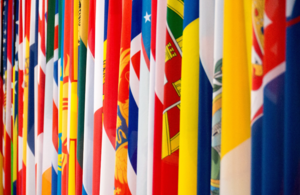Hong Kong (CNN) To the upbeat sounds of a blue-uniformed brass band, the rally proceeded through downtown Hong Kong.
Marchers, dressed all in yellow, carried purple lotus plants, yin-yang symbols, and other traditional Buddhist icons. But it was their giant banners, held aloft or mounted on small floats, that indicated this was not just a religious rally.
"Keep away from the Chinese Communist Party. Stop the persecution of Falun Gong."
A religious movement that emerged in China in the mid-1990s, Falun Gong surged in popularity nationwide before it was banned and brutally suppressed on the mainland in 1999. But it continues to operate in Hong Kong thanks to the territory's greater human rights protections.
For decades now, Falun Gong protests against the Chinese government have been a common sight on the city's streets, with practitioners setting up gory mock surgery scenes to raise awareness about allegations of organ harvesting, and handing out free copies of the Falun Gong-linked newspaper, Epoch Times. Protesters have also targeted Chinese politicians and offices in the city, and regularly take part in mass anti-government rallies and marches.
Crossing the border by bus from China and seeing Falun Gong practitioners handing out anti-Communist Party leaflets was once one of the most visible signs of Hong Kong's relative autonomy from Beijing.
All that could soon be deemed illegal under a sweeping new security law passed by China for Hong Kong last month that criminalized "acts of secession, subversion of state power, terrorist activities, and collusion with foreign or external forces to endanger national security."
Similar laws in China have been used to go after Falun Gong practitioners, which Beijing denounces as an "evil cult" that "preaches heretical fallacies that are anti-humanity and anti-science" through the control of people's minds.
Falun Gong practitioners reject these charges and maintain they have been unfairly targeted and suppressed by the Chinese authorities. Thousands of Falun Gong practitioners are believed to be held "at various prisons and extralegal detention centers" in mainland China, according to Washington-based rights group Freedom House -- an accusation Beijing also denies.
"The new National Security Law will act like a sharp knife hanging over the (association) and the heads of every Falun Gong practitioner in Hong Kong," said Ingrid Wu, spokeswoman for the Hong Kong Falun Dafa Association. "We are very concerned."
Hong Kong officials have claimed the new law is necessary and will only affect a handful of individuals. In early July, Chief Executive Carrie Lam pushed back against the suggestion the law would undermine people's freedoms.
"The legal principles that we attach a lot of importance to, like presumption of innocence and no retrospective effect and so on, are being upheld," she said. "Instead of spreading fear, the law will actually remove fear and let Hong Kong people return to a normal, peaceful life."
A government spokeswoman did not respond to emailed questions about concerns regarding religious freedom under the law.
Hong Kong has long been a safe haven for entities which could never operate in China, from banned religious movements and labor rights NGOs, to big tech firms blocked by the Great Firewall. The fate of groups like Falun Gong -- fierce opponents of Beijing who, while not the immediate targets of the law still come within its broad remit -- will test those assurances to the hilt.
.
New age religion
Founded by Li Hongzhi in northeastern China in the early 1990s, Falun Gong blends traditional Chinese qigong practices and new age beliefs. It was once promoted by the Chinese government and state media as part of a nationwide qigong craze, but as Falun Gong grew in size, attracting millions of followers, the authorities turned on the group.
Li encouraged a blistering public relations strategy in a bid to win over the critics, and between 1996 and 1999, the group staged some 300 protests and demonstrations, historian David Ownby writes in "Falun Gong and the Future of China."
This culminated in an audacious, and strategically disastrous, demonstration around central government headquarters in Beijing involving around 10,000 practitioners. It was the biggest protest the capital had seen since the 1989 Tiananmen crackdown, and was the beginning of the end for Falun Gong in China.
The protesters in Beijing were calling for the removal of restrictions placed on the faith, but the Chinese authorities responded with a massive crackdown and huge propaganda push demonizing Falun Gong.
"I was shocked," said Rose, a Hong Kong-based Falun Gong practitioner. "I had friends who were traveling between Hong Kong and Beijing, they told me a crackdown was about to take place, but I said this was impossible, Falun Gong was just a belief, nothing political."
Originally from mainland China, Rose began practicing Falun Gong after moving to Hong Kong in the late 1990s. CNN is withholding her full name due to fears of prosecution under the new security law.
After Falun Gong was banned, Rose's husband and several of her close friends urged her to keep a low profile, to just do her exercises and readings at home. But she was sure there had been some sort of mistake, and so, just has her fellow practitioners had done in Beijing, she sought to appeal to the government, to make the case for Falun Gong.
"A group of us went to the Liaison Office," she said. "But no one came out, we stayed there for 24 hours."
The Liaison Office is the Chinese government's Hong Kong headquarters, long a symbol of Beijing's influence over the city.
Days turned into weeks, then months. Every day, Rose and a small group of fellow practitioners gathered outside the office on 160 Connaught Road to attempt to have their message heard.
One day the protesters were joined by a group of Swiss practitioners who had originally hoped to travel to Beijing to protest but were denied visas. Police attempted to remove the group, which, according to court documents never numbered more than 16, and was "peaceful and largely static."
Police moved to clear the protest, however, and charged the Falun Gong protesters with obstruction, among other offenses. The case eventually wound up at the Court of Final Appeals, where Hong Kong's top justices ruled strongly in favor of the right to protest and use "reasonable force to resist being subjected to unlawful detention."
The case was a major victory not just for Falun Gong but for anti-government protesters in general, securing -- until last year's anti-government protests -- the right to stage protests outside the Liaison Office.
New restrictions
While Falun Gong practitioners are not the primary target of the new security law -- which is at times clearly designed to criminalize acts seen during last year's anti-government protests -- they and other groups like them could still fall foul of its broad remit.
In particular, the new offense of subversion makes it illegal in many circumstances to advocate "overthrowing the body of central power of the People's Republic of China." Given that the PRC government is indelibly intertwined with the Communist Party, Falun Gong efforts to get people to quit the Communist Party in protest, or otherwise harm its activities, could be deemed criminal.
The new crime of "collusion with a foreign country or with external elements to endanger national security" could also be used to target Falun Gong. While not a top-down religion like the Catholic Church or other similar faiths with large numbers of followers in Hong Kong, Falun Gong is headquartered in the United States, where Li Hongzhi has lived since 1996, and this is where the group's main media and lobbying arms are also located.
Under Article 29 of the new law, anyone who "conspires with a foreign country or an institution, organization or individual outside (China), or directly or indirectly receives instructions, control, funding or other kinds of support" from such organizations, could be prosecuted if they are found to be "provoking by unlawful means hatred among Hong Kong residents towards the Central People's Government or the Government of the Region, which is likely to cause serious consequences."
With initial prosecutions under the security law all related to recent protests, Falun Gong practitioners could find themselves -- if the law's critics are correct -- being a test case of another sort, an expansion of the law's remit to ban activities that have long been verboten on the mainland.
"How the situation of Falun Gong practitioners in Hong Kong evolves in the coming months and how much of the repression leaks over from the mainland is a very important space to watch," said Sarah Cook, a senior research analyst at Freedom House and author of "The Battle for China's Spirit: Religious Revival, Repression, and Resistance under Xi Jinping."
Outside of the protest movement, Falun Gong is among the most vocal and visible opposition to the Communist Party, in both Hong Kong and elsewhere around the world. While the group is somewhat detached from the mainstream opposition in Hong Kong due to its conservative religious beliefs, this has not stopped its presence in the city being symbolic, and many followers take a sort of pride that even Falun Gong can operate in Hong Kong, given the huge antipathy Beijing has towards the group.
"The ability of people in Hong Kong to practice Falun Gong legally and openly is important both symbolically and practically," said Erping Zhang, a US-based spokesman for the group.
Zhang said that as well as the new crimes created under the law, he was concerned about the broad rights it gives Chinese security services to operate in Hong Kong, even extending Chinese jurisdiction over certain cases and allowing people to be taken for trial on the mainland.
"It could truly take a horrific toll on Falun Gong practitioners in Hong Kong and create huge losses for those who have benefited from the practice and activists' awareness raising activities," he said.
Cook, the Freedom House researcher, said that any curtailment of Falun Gong in the city "would be a bad sign and a potentially worrying precursor to a crackdown on the broader religious community in Hong Kong."
"Within China we've sign time and again since 1999 how the rules, tactics, and even security forces initially created to persecute Falun Gong are then expanded to other targets," she added. "It may only be a matter of time before we see that in Hong Kong too, unfortunately."
But not all religious groups are alarmed. In a letter to the religious newspaper Church Times this month, Paul Kwong, Archbishop of Hong Kong, praised the new security law and pushed back against criticism from figures including Cardinal Maung Bo, president of the Asian Bishops' Conferences.
"Many critics do not accept the fact that we are part of China," Kwong said. "They only emphasize two systems, not one country. I cherish our Hong Kong freedoms -- in particular the freedom of religion and way of life -- as much as anyone, and I don't think this law will change any of that. I am also proud to be living in China."
Freedom of speech
Numerous concerns have been raised about the new law's potential effects on freedom of speech in Hong Kong, with people already moving to scrub their social media and remove posters and pamphlets criticizing the government from shops and restaurants.
Media groups have expressed alarm about the law, with the Foreign Correspondents' Club writing to the city's leader Lam "seeking clarity on specific areas where the new law is vague and where terms are undefined, particularly regarding the press and freedom of speech."
Lam previously said "the law has clearly defined the four types of acts and activities which we need to prevent, curb and punish in accordance with the law."
"If the Foreign Correspondents' Club or all reporters in Hong Kong can give me a 100% guarantee that they will not commit any offenses under this piece of national legislation, then I can do the same," she added.
Here again, Falun Gong may find themselves at the inadvertent frontlines of Hong Kong's battle for civil liberties. During a recent protest against the law on July 1, Falun Gong practitioners could be seen handing out flyers saying "Heaven will destroy the Chinese Communist Party" as well as copies of Epoch Times. The newspaper, which was founded by Falun Gong practitioners and remains closely linked to the group, is one of the most vocally anti-government publications in the city.
Its Chinese edition refers to the coronavirus as the "Chinese Communist Party virus," has called on the West to "fight back" against the Party, and regularly publishes stinging critiques of Beijing.
Representatives for Epoch Times in Hong Kong and New York did not respond to a request for comment.
Like Apple Daily, a pro-democracy tabloid owned by tycoon Jimmy Lai, currently facing charges related to last year's protests, Epoch Times could be a canary in the coal mine for Hong Kong's media freedoms. Both papers have cultivated influence in Washington -- something that could both help or harm them, leading to politicians speaking out in their defense, but also Beijing casting them as colluding with foreign forces.
Lai has long been close to Republican Party politicians, leading to claims of his being a foreign agent in Chinese state media, while the English edition of the Epoch Times since 2016 has aggressively targeted Trump voters, with opinion content taking on an increasingly right-wing stance.
In 2019, the paper was barred by Facebook from running ads on its platform, after finding it violated the company's policies with pro-Trump campaigns.
Uncertain future
Hong Kong and Beijing officials have repeatedly claimed that the security law is both necessary and restrained, and will only affect a tiny handful of individuals in the city, mainly violent separatists.
Paraphrasing former Chinese leader Deng Xiaoping to British Prime Minister Margaret Thatcher about Hong Kong's success after China took control, Chinese Foreign Ministry spokesman Zhao Lijian said this week that under the new law "horses will run faster, stocks will be more sizzling, and dancers will dance more happily."
But with moves to ban books and expand police powers of surveillance and censorship, the scope of the law would appear to be expanding.
Falun Gong practitioners, as well as many other groups in Hong Kong opposed to Beijing, may not immediately feel the sting of the new regulations, but they were poised for the worse. After years of suppression in China, however, the group is better prepared than most for how to function behind the scenes, even if that will require a complete overhaul of its Hong Kong operation.
Zhang, the US-based spokesman, said that within China still, people "continue to practice Falun Gong in private and many go out and discretely disseminate information to help other Chinese see through the CCP's lies and cover-ups."
Many practitioners in Hong Kong are in the city because they fled China, and Wu, the local spokeswoman said some may choose to go overseas should the law target them.
"The Falun Gong community is diverse; each person makes their own decision based on their family and other situations," she said. "But most of Falun Gong practitioners that I know plan to stay in Hong Kong. We feel it is our responsibility to continue our peaceful efforts of raising awareness of the persecution and calling for justice, and tell the world what is happening in Hong Kong."
https://www.cnn.com/2020/07/18/asia/hong-kong-china-falun-gong-intl-hnk/index.html












